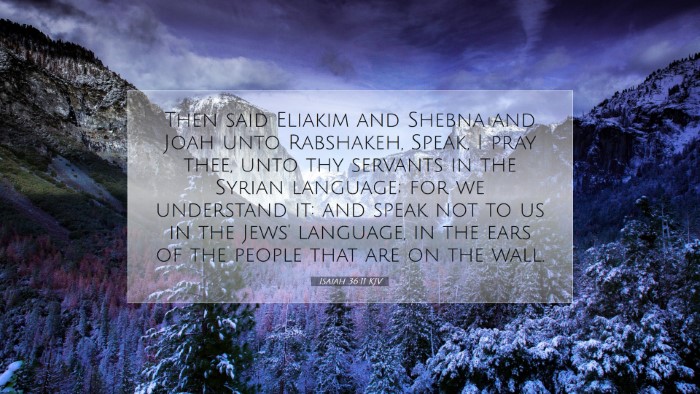Commentary on Isaiah 36:11
Verse: Isaiah 36:11
(“Then said Eliakim and Shebna and Joah unto Rabshakeh, Speak, I pray thee, unto thy servants in the Syrian language; for we understand it: and speak not to us in the Jews' language, in the ears of the people that are on the wall.”)
Contextual Background
The book of Isaiah is set during a time of social and political upheaval in ancient Israel and Judah. Isaiah prophesies in the context of the Assyrian empire’s surrounding threats. Isaiah 36 poses a specific challenge posed by the Assyrian envoy, Rabshakeh, which serves to reveal deeper themes of faith, diplomacy, and communication in the face of adversity.
Insights and Reflections
Understanding the Characters
The Importance of Language
Language is a powerful tool, both for communication and for manipulation. The leaders' request for Rabshakeh to speak in Aramaic points to their desire to protect their people from fear and despair. As Matthew Henry notes, “a wise leader understands the implications of his words on his audience.” By speaking in a language that the average people did not understand, they aimed to shield them from the potentially demoralizing rhetoric of the Assyrians.
The Role of Diplomacy in Crisis
The encounter with Rabshakeh provides a vivid illustration of diplomacy under tension. Albert Barnes emphasizes that the leaders recognizing the significance of Rabshakeh's words shows their awareness of the psychological warfare employed by the Assyrians. They understand that Rabshakeh's speech is not merely a communication of threat but also serves to instill fear and division.
Spiritual Implications
This moment in Isaiah reflects broader spiritual implications about confronting fear, doubt, and discouragement. The leaders’ request to speak in Aramaic can symbolize a plea for spiritual and emotional protection. Adam Clarke addresses this, saying that leaders must consider the spiritual well-being of their people and the narratives that are allowing fear to take root in their hearts.
Public and Private Discourse
There is a profound distinction between public and private discourse illustrated in this verse. The leaders' desire for a conversation in private language signifies the need to filter information that is shared with the public for the sake of unity and faith. Matthew Henry points out that the public display of fear can be infectious, and thus, leaders must think carefully about what messages should reach the people.
Application for Today
The lessons drawn from Isaiah 36:11 are particularly relevant in the church today. Leaders must be mindful of how they speak about crises, the language they choose, and the narratives they create. Just as Eliakim, Shebna, and Joah acted in the interest of their people, modern church leaders should cultivate an environment of hope and spiritual resilience.
Concluding Thoughts
Isaiah 36:11 serves not merely as a historical account but as a poignant reminder of the necessity of wise leadership and careful communication amid distressing circumstances. The balance of protecting the flock while acknowledging the severity of opposition is a timeless lesson for pastors and theologians alike. In this world, where words have the power to uplift or destroy, may we strive to communicate with grace, wisdom, and an unwavering resolve to point others to faith in God.


